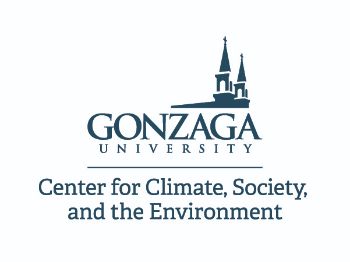
[FILLED] Climate Resilience Project
Host: Gonzaga University Center for Climate, Society, & the Environment
Region: Washington
Openings: 1
Project Focus: Climate Adaptation, Disaster Response / Emergency Management, Public Health
Skills Needed: Community Engagement, Public Speaking, Community Outreach, Stakeholder Engagement, Detail-Oriented, Self-Motivated
Service Needs & Plans
The Climate Resilience Project—an initiative of Gonzaga’s Center for Climate, Society, and the Environment—seeks to help our community build and sustain climate resilience. We pursue this work in partnership with many partners, including the Climate and Health Adaptation Initiative (CHAI), WA State Department of Health (DOH), Spokane Regional Health District (SRHD), SNAP, the Spokane City Council Sustainability Action Subcommittee, and local community centers.
We seek a CivicSpark Fellow to support the Center’s work in two areas. (1) expanding and building on our heat health awareness campaign and (2) cultivating community resilience with a focus on climate resilience hub planning and implementation.
(1) Spokane Beat the Heat is an initiative of Gonzaga University’s Climate Resilience Project that seeks to help our community understand and respond to the challenge of extreme summer heat. Currently, we are working with SRHD to design education materials for a heat health education campaign. We seek a CivicSpark Fellow to advance our heat work through the implementation of a heat health education campaign. The primary deliverables for advancing our heat work will include working with community partners to share our heat heath education materials through tabling events, presentations or workshops.
(2 )We seek a CivicSpark Fellow to support the Center’s work of cultivating community resilience with a focus on climate resilience hub planning and implementation. Resilience Hubs are defined by the Urban Sustainability Directors Network (USDN) as “community-serving facilities augmented to support residents and coordinate resource distribution and services before, during, or after a natural hazard event.” Referring to the phases from the Guide for Developing Resilience Hubs, designed by the USDN, the work will primarily focus on these four phases: (1) Assess vulnerability and select neighborhood(s); (2) Select a project team and set goals; (3) Identify and evaluate sites; and (4) Identify resilience solutions. The primary deliverables for resilience hubs will include phases 1-3, with a reach goal of phase 4.
Project DescriptionThe Climate Resilience Project is a part of Gonzaga’s Center for Climate, Society, and the Environment (Climate Center), which aims to help our community understand and respond to the challenges of a changing climate in order to create an equitable, verdant community.
Overarching goals of the project include fostering community relationships, collaborating with community members to develop equitable community-based solutions, decision support for policy makers and community leaders, designing and distributing heat health education materials, and supporting the voices and decisions of frontline communities.
The CivicSpark Fellow will play a key role in supporting the Climate Center’s Director and Resilience Program Coordinator in achieving the goals of this important program. The desired project outcomes include designing and implementing a heat health education campaign, identifying potential service sites for resilience hubs, establishing community goals of a climate resilience hub, and working with community members to identify resilience hub solutions.
Resilience Hubs will provide the additional resources needed for communities who are disproportionately exposed and impacted by natural and human-made disasters including extreme weather events, wildfire smoke as well providing resources for everyday functions.
•Supports the Director and Resilience Program Coordinator in achieving the goals of the Climate Center’s resilience program
•Work with community partners such as the Spokane City Council Sustainability Action Subcommittee and other community leaders to execute Climate Center Resilience programs.
•Ability to build strong relationships with municipal organizations and other community organizations, particularly with over-burdened populations.
•Incorporate environmental justice into all climate resilience programming.
•Co-facilitate community meetings with a variety of stakeholders including government officials, non-profits, community members, and businesses
•Help Director and Resilience Program Coordinator develop and deliver climate planning and resilience workshops, trainings, and programs.
•Communicate effectively with on campus and off campus partners.
•Participate in internal and external meetings.
Our workplace is on a college campus, Gonzaga University, with a student population of ~5000 undergraduates in a vibrant inland northwest city of 250,000 people. The Gonzaga Climate Center itself is located in a beautiful suite in the university’s Foley Library. We have a staff of 3 FTE and approximately 10 student employees. It is a dynamic, welcoming, and justice minded community, both within the Climate Center and on campus generally.
Gonzaga University’s work values include:
Promoting Excellence in Academic Endeavors and Professional Practice
Fostering intellectual depth, competence, reflection, and creativity in pursuing exemplary, rather than satisfactory, outcomes.
Sharing Responsibility for Mission Identity and Leadership
Making a personal commitment to learn about Gonzaga’s mission, discovering ways to contribute personally and collaboratively to our distinctive learning and research community.
Affirming a Commitment to Human Dignity
Engaging one another with profound respect, professionalism, and an ethic of care while supporting one another’s continued learning, development, and maximizing of potential.
Advancing a Culture of Inclusiveness
Developing cultural fluencies and global awarenesses, and practicing habits that enable us to value, recruit, and support community members from historically underrepresented backgrounds.
Caring for the Earth while Stewarding our University Resources
Recognizing the interconnectedness of human life and the Earth, safeguarding and conserving University resources, balancing the needs of the moment with those of the future.
Cultivating Individual and Community Accountability
Demonstrating mutual commitment to our shared project by holding ourselves and others responsible for actions, expecting appropriate behavior, and aligning activities with ethical and professional standards.
On-site
